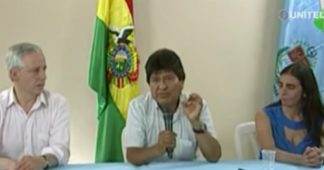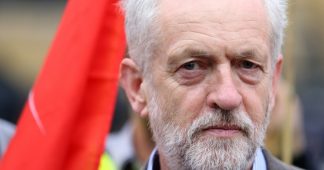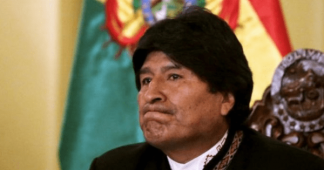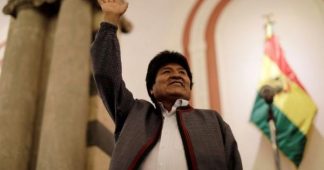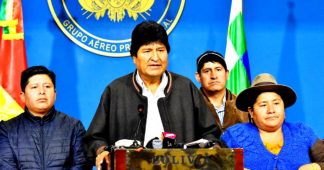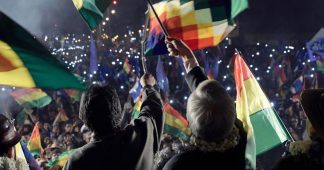Evo Morales has stepped down as Bolivia‘s president after the military encouraged him to leave the post to ensure stability following weeks of protests against his disputed re-election.
In a televised address on Sunday, Latin America’s longest-serving leader, said he was resigning for the “good of the country”.
“I want to tell you, brothers and sisters, that the fight does not end here,” Morales said from his stronghold in the Chapare region in central Bolivia.
“We will continue this fight for equality, for peace,” added the 60-year-old, who called himself the victim of a “coup”.
Following his statement, Vice President Alvaro Garcia Linera also said he was resigning.
The announcements prompted celebrations but there were also reports of violent unrest erupting in the administrative capital, La Paz, in the city of El Alto and other parts of the country.
Morales said his house in Cochabamba was attacked by “violent groups” and, on Twitter, accused police of issuing an “illegal” warrant for his arrest.
Bolivia’s police chief denied the claim in a television interview on Sunday, while the military said in a statement that it was launching air and land operations to “neutralise” groups acting unlawfully.
The resignation of the last survivor of the so-called “pink tide”, which ushered in left-wing governments in Latin America two decades ago, prompted reactions across the region and beyond.
Here is a round-up of international responses to the latest developments.
United Nations
Antonio Guterres, the UN secretary-general, expressed deep concern about the situation in Bolivia, according to his spokesman.
Stephane Dujarric said the UN chief “urges all relevant parties to refrain from violence, reduce tensions and exercise maximum restraint”.
Mexico
Mexican President Andres Manuel Lopez Obrador on Monday said the events in Bolivia were “regrettable”.
His foreign minister, Marcelo Ebrard, went a step further, calling the developments in Bolivia a “coup”.
Ebrard added that Mexico would call an urgent meeting of the Organization of American States (OAS).
On Sunday, Ebrard described the events in Bolivia as “an ongoing military operation”.
“It was similar to those tragic events that gripped our Latin American [continent] last century,” said Ebrard, who assumed his role after a left-wing party won Mexico’s election in July last year.
“Mexico will maintain its position of respect for democracy and institutions.”
Ebrard added that Mexico had already received 20 members “of the Bolivian executive and legislative in its official residence in La Paz,” adding that his country would offer Morales asylum if he sought it.
En Bolivia hay una operación militar en curso, la rechazamos,es similar a aquellos trágicos hechos que ensagrentaron nuestra América Latina el siglo pasado. México mantendrá su posición de respeto a la democracia y las instituciones. Golpe no.
— Marcelo Ebrard C. (@m_ebrard) November 10, 2019
México,de conformidad a su tradición de asilo y no intervención, ha recibido a 20 personalidades del ejecutivo y legislativo de Bolivia en la residencia oficial en La Paz, de así decidirlo ofrceríamos asilo también a Evo Morales.
— Marcelo Ebrard C. (@m_ebrard) November 10, 2019
He said on Monday that Mexico had not received a reply on its offer of asylum to Morales.
Nicaragua
Nicaragua’s left-wing government also came to Morales’s defence, issuing a statement that decried the situation as a “coup”.
“The government of Nicaragua … denounces and strongly condemns the coup d’etat that was realised today,” President Daniel Ortega said in a statement.
“We reiterate our firm and unchanging support for President Evo, his constitutional government,” Nicaragua’s vice president and first lady, Rosario Murillo, said in a statement.
Chile
In Chile, the right-leaning government expressed concern about Bolivia’s interrupted electoral process.
It also called for a prompt peaceful and democratic solution within the framework of the constitution.
Argentina
Argentina’s foreign ministry endorsed a report by the OAS, which on Sunday recommended the holding of new elections, and expressed that if new polls were to be held they should be carried out “with all guarantees of freedom and transparency”.
Meanwhile, Argentina‘s President-elect Alberto Fernandez, who will assume the role in December, said a “coup” had been carried out in Bolivia.
“It was a coup perpetrated against the president who had called for a new electoral process.”
“We, defenders of democratic institutions, repudiate the unleashed violence that prevented Evo Morales conclude his presidential term, and altered the course of the electoral process,” he added.
Nosotros, defensores de la institucionalidad democrática, repudiamos la violencia desatada que impidió a @evoespueblo concluir su mandato presidencial y alteró el curso del proceso electoral.
— Alberto Fernández (@alferdez) November 10, 2019
Venezuela
Venezuela’s President Nicolas Maduro also condemned what he described as a “coup” against Morales, adding that rallies would be held to defend “the life of the Bolivian native people, victims of racism”.
Condenamos categóricamente el golpe de Estado consumado contra el hermano presidente @evoespueblo. Los movimientos sociales y políticos del mundo nos declaramos en movilización para exigir la preservación de la vida de los pueblos originarios bolivianos víctimas del racismo. pic.twitter.com/c6JGrNBFGo
— Nicolás Maduro (@NicolasMaduro) November 10, 2019
Meanwhile, opposition leader Juan Guaido said the continent was feeling “the democratic hurricane in Latin America”.
“Long live Bolivia, the favourite daughter of the liberator [Simon Bolivar].”
¿Brisa?
¡Lo que se siente es el huracán democrático en América Latina!
Que viva Bolivia, la hija predilecta del libertador— Juan Guaidó (@jguaido) November 10, 2019
Peru
In Peru, the government called for the restoration of “peaceful existence in Bolivia”.
It also called for “transparent elections” with the help of the OAS.
Cuba
Cuban President Miguel Diaz-Canel accused Bolivia’s right of launching a “violent and cowardly coup d’etat”.
He also called on the international community to mobilise to defend Morales’s life and freedom.
La derecha con violento y cobarde golpe de estado atenta contra la democracia en #Bolivia. Nuestra enérgica condena al golpe de estado y nuestra solidaridad con el hermano Pdte @evoespueblo. El mundo se debe movilizar por la vida y la libertad de Evo. #EvoNoEstasSolo #SomosCuba pic.twitter.com/dPvZ8zQqJA
— Miguel Díaz-Canel Bermúdez (@DiazCanelB) November 10, 2019
Colombia
For its part, the Colombian foreign ministry issued a statement calling for the mobilisation of the international community for “a process of peaceful transition”.
The centre-right government also requested an urgent meeting of the OAS’s permanent council to discuss the events.
COMUNICADO DEL MINISTERIO DE RELACIONES EXTERIORES: Colombia solicita reunión urgente del Consejo Permanente de la OEA https://t.co/ru5Fh6R3Cb pic.twitter.com/JB9K96EV83
— Cancillería Colombia (@CancilleriaCol) November 10, 2019
Brazil
Brazil‘s far-right President Jair Bolsonaro said in a post on Twitter that Morales’s resignation was the culmination of “denunciations” of “fraud allegations”.
“The lesson for us is the need, in the name of democracy and transparency, to count votes that can be audited. The VOTE is a sign of clarity for Brazil!”
Denúncias de fraudes nas eleições culminaram na renúncia do Presidente Evo Morales. A lição que fica para nós é a necessidade, em nome da democracia e transparência, contagem de votos que possam ser auditados. O VOTO IMPRESSO é sinal de clareza para o Brasil! pic.twitter.com/MlmebgqjGQ
— Jair M. Bolsonaro (@jairbolsonaro) November 10, 2019
Meanwhile, former Brazilian President Luiz Inacio Lula da Silva denounced a “coup” and said Morales “was forced to resign”.
“It is unfortunate that Latin America has an economic elite that does not know how to live with democracy. And the social inclusion of the poorest,” he added.
Acabo de saber que houve um golpe de estado na Bolívia e que o companheiro @evoespueblo foi obrigado a renunciar. É lamentável que a América Latina tenha uma elite econômica que não saiba conviver com a democracia e com a inclusão social dos mais pobres.
— Lula (@LulaOficial) November 10, 2019
United States
The US said it was monitoring the political situation in Bolivia and calling on civilian leadership to maintain control, a State Department official said on Monday.
“It is crucial that the constitutionally delineated civilian leadership maintain control during the transition,” the official told Reuters news agency on customary condition of anonymity.
“We call on everyone to refrain from violence during this tense time and we will continue to work with our international partners to ensure that Bolivia’s democracy and constitutional order endure.”
Russia
In a statement, Russia‘s foreign ministry called on all political forces to “show common sense” while it encouraged them to act responsibly.
It also accused Bolivia’s opposition of unleashing a wave of violence in the country.
United Kingdom
In the UK, Jeremy Corbyn, the head of the main opposition Labour Party, also labelled Morales’s resignation a “coup”.
To see @evoespueblo who, along with a powerful movement, has brought so much social progress forced from office by the military is appalling.
I condemn this coup against the Bolivian people and stand with them for democracy, social justice and independence. #ElMundoConEvo
— Jeremy Corbyn (@jeremycorbyn) November 10, 2019
European Union
Federica Mogherini, European Union‘s foreign policy chief, has urged restraint and responsibility from all parties in the country, while she asked them to “lead the country peacefully and quietly to new credible elections”.
.@FedericaMog on the recent developments in ?? Bolivia: “Our wish that all parties in the country exercise restraint and responsibility and lead the country peacefully and quietly to new credible elections that can let the people of Bolivia express their democratic will” #FAC pic.twitter.com/ax9nV78oMk
— European External Action Service – EEAS ?? (@eu_eeas) November 11, 2019
